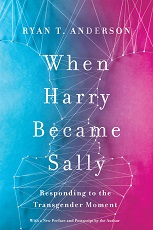First Things
Ryan T. Anderson

My book When Harry Became Sally: Responding to the Transgender Moment was released exactly three years ago. It was attacked twice on the New York Times op-ed page. The Washington Post ran a hit piece on it that was riddled with errors. It was obvious the critics hadn’t read the book. But they were threatened by it and wanted to discredit it lest anyone pick it up and learn from it.
Now, three years after publication, in the same week that the House of Representatives plans to ram through the Equality Act—a radical transgender bill amending the Civil Rights Act of 1964—Amazon has erased my book opposing gender ideology from its cyber shelves.
The people who did read the book discovered that it is an accurate and accessible presentation of the scientific, medical, philosophical, and legal debates surrounding the trans phenomenon. Yes, it advances an argument against transgender ideology from a viewpoint. But it doesn’t get any facts wrong, and it doesn’t engage in heated rhetoric.
Moreover, it was praised by experts: the former psychiatrist-in-chief at Johns Hopkins Hospital, a longtime psychology professor at NYU, a professor of medical ethics at Columbia Medical School, a professor of psychological and brain sciences at Boston University, a professor of neurobiology at the University of Utah, a distinguished professor at Harvard Law School, an eminent legal philosopher at Oxford, and a professor of jurisprudence at Princeton. . . [Full text]